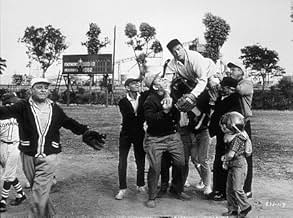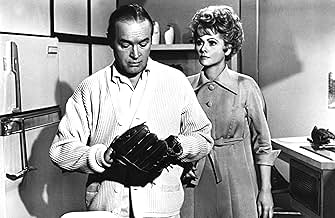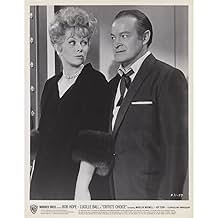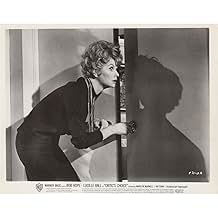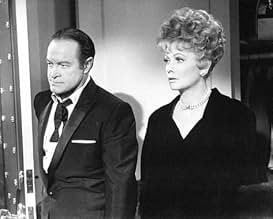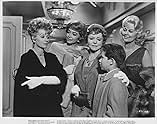IMDb RATING
5.7/10
1.2K
YOUR RATING
Parker Ballantine is a New York theater critic and his wife writes a play that may or may not be very good. Now Parker must either get out of reviewing the play or cause the breakup of his m... Read allParker Ballantine is a New York theater critic and his wife writes a play that may or may not be very good. Now Parker must either get out of reviewing the play or cause the breakup of his marriage.Parker Ballantine is a New York theater critic and his wife writes a play that may or may not be very good. Now Parker must either get out of reviewing the play or cause the breakup of his marriage.
Rickey Kelman
- John Ballantine
- (as Ricky Kelman)
Joseph Gallison
- Philip 'Phil' Yardley
- (as Evan McCord)
- Director
- Writers
- All cast & crew
- Production, box office & more at IMDbPro
Featured reviews
This movie has possibly the lowest entertainment value/star power ratio I've ever seen. Bob Hope and Lucille Ball, two of the 20th century's greatest comedy geniuses. Plus the legendary Jim Backus, Rip Torn, and a surprise uncredited cameo from a television comedy icon of the 1950's and 1960's who has a brief part as a hotel clerk. You almost have to give the writing, directing, and production team credit for taking a cast this spectacularly talented, and making them so dull and unfunny.
A major problem is the casting. The lovable Bob Hope as a mean-spirited, psychologically abusive husband? Lucille Ball as a mousy, milquetoast-ish wife who mostly takes the abuse her pathetic husband dishes out? The real life Lucille Ball would have kicked Bob Hope's character to the curb after the first 30 seconds -- and we all would have cheered!
But another major problem is that everyone seems to be sleepwalking through their parts. You would expect Jim Backus and Rip Torn to breathe a little life into their characters, but quite untypically, they seem to be phoning in their lines and waiting for their paychecks. Although I am quite impressed with Rip Torn's ability to do handstands in his younger days.
If you are a fan of any of these stars, they ALL have done better films. I'd suggest checking those out first.
A major problem is the casting. The lovable Bob Hope as a mean-spirited, psychologically abusive husband? Lucille Ball as a mousy, milquetoast-ish wife who mostly takes the abuse her pathetic husband dishes out? The real life Lucille Ball would have kicked Bob Hope's character to the curb after the first 30 seconds -- and we all would have cheered!
But another major problem is that everyone seems to be sleepwalking through their parts. You would expect Jim Backus and Rip Torn to breathe a little life into their characters, but quite untypically, they seem to be phoning in their lines and waiting for their paychecks. Although I am quite impressed with Rip Torn's ability to do handstands in his younger days.
If you are a fan of any of these stars, they ALL have done better films. I'd suggest checking those out first.
Bland comedy/drama about nasty theater critic Bob Hope, who's only happy when he's trashing the latest Broadway sensation, has to contend with his wife, Lucille Ball, deciding she wants to become a playwright. Will Bob write a nasty review of his wife's play? Will Bob write a gushing review? I'm not sure there's any real suspense what actually happens, but the only reason to watch this film is for Hope and Ball, who are good, but the jokes are sadly not all that funny. It also doesn't help that the film lacks the rapid pace of Hope's better comedies. Overall, "Critic's Choice" features two brilliant comedians in a less than brilliant comedy. FUN FACT: This film was based on a play by Ira Levin, who's best known as the author of "Rosemary's Baby" and "The Stepford Wives."
Mention the name Lucille Ball, and what comes to mind for most of us is the zany character in the long-running 1950s TV comedy show, "I Love Lucy." But, I wonder if Lucy started out with a wish to be a comedienne, or if she had her eyes on any other fields of stage or screen. Comedy was part of her early roles, but she also had roles in which she sang and danced ("Dance, Girl, Dance" of 1940). And there can be no doubt about her acting ability from such dramatic and suspense films as "Valley of the Sun" and "The Big Street" in 1942; or "The Dark Corner" in 1946; or "Lured" in 1947.
On the other hand, there's little doubt about Bob Hope's aspirations. From his earliest days in vaudeville, Hope was a comedian, and he would always be a comedian. For all his kidding aside about earning as Oscar, Bob knew that he had little chance because Oscar very rarely went to a comedian. He even made his overt desire for an Oscar a part of his long- running comedy routines, and it was sure to get a laugh decade after decade
That doesn't mean that Bob Hope didn't do some very funny movies. But his type of humor wasn't the subtle, clever or zany type that usually involved great or very good acting. Clark Gable, James Stewart, Carole Lombard and Claudette Colbert were some of the very accomplished dramatic actors who could do Oscar-winning caliber comedy in movies. Bob's comedy forte was the one-liner. Or, make that, a string of one- liners, one after the other. And in that, he often aroused some great laughter.
So, that brings us to this movie, "Critic's Choice." This film is meant to be a semi-serious movie about Broadway and a critic's life, with a comedic outlook. And Lucy plays a serious character, a "straight man" to Bob's wisecracks and one-liners. I think it was intended as a light comedy to begin with, sans any zaniness on Lucy's part. The very funny parts are in the last half with Bob. He has some zany scenes himself, and a few strings of one-liners that bring out loud laughter. Some examples are: "This is the drunkenest room I've ever been in." "This apartment's all uphill." And, "I'd just like to be there when we get where I'm going."
"Critic's Choice" is a nice film for an evening of light entertainment, and worth watching just to see two of the great comics of all time together.
On the other hand, there's little doubt about Bob Hope's aspirations. From his earliest days in vaudeville, Hope was a comedian, and he would always be a comedian. For all his kidding aside about earning as Oscar, Bob knew that he had little chance because Oscar very rarely went to a comedian. He even made his overt desire for an Oscar a part of his long- running comedy routines, and it was sure to get a laugh decade after decade
That doesn't mean that Bob Hope didn't do some very funny movies. But his type of humor wasn't the subtle, clever or zany type that usually involved great or very good acting. Clark Gable, James Stewart, Carole Lombard and Claudette Colbert were some of the very accomplished dramatic actors who could do Oscar-winning caliber comedy in movies. Bob's comedy forte was the one-liner. Or, make that, a string of one- liners, one after the other. And in that, he often aroused some great laughter.
So, that brings us to this movie, "Critic's Choice." This film is meant to be a semi-serious movie about Broadway and a critic's life, with a comedic outlook. And Lucy plays a serious character, a "straight man" to Bob's wisecracks and one-liners. I think it was intended as a light comedy to begin with, sans any zaniness on Lucy's part. The very funny parts are in the last half with Bob. He has some zany scenes himself, and a few strings of one-liners that bring out loud laughter. Some examples are: "This is the drunkenest room I've ever been in." "This apartment's all uphill." And, "I'd just like to be there when we get where I'm going."
"Critic's Choice" is a nice film for an evening of light entertainment, and worth watching just to see two of the great comics of all time together.
If you want to see Lucy at her least funny, watch this. She looks like she has a lot of personal strain, or something. Lucy never clicked in the movies for some reason, but on TV she soared. Bob Hope also struggles with the lame screenplay. You'll recognize many of the faces here, like Jim Backus and Rip Torn, among others. Apparently the play that this is based on got good reviews, but this movie version is so bad I'm surprised they didn't stop production and revamp it. On an up note, the movie is an indispensable time capsule. With JFK's assassination and the Beatles, this early 60's world would soon change forever. It's also worth seeing for the tiny Soupy Sales cameo.
New York theater critic Parker Ballantine (Bob Hope) is married to wannabe playwright Angela (Lucille Ball). They live with his son John from his previous marriage to flighty actress Ivy London (Marilyn Maxwell). Angie is writing a play about her family and he's rather dismissive. According to him, she doesn't finish anything. She actually finishes and Dion Kapakos (Rip Torn) is directing it.
It's interesting that his second wife is more age appropriate than the first wife. I would expect it to be the opposite. A switch would make them fit the stereotypes, but it would also deprive the movie of the Hope Ball pairing. I'll take the pairing over the stereotyping. Their stardoms have faded from their pinnacles, but they still have plenty of star power. As a comedy, this is lacking especially considering the two legends involved. It's more a drama than a comedy. At least, it's better as a drama than a comedy. Bob Hope does his comedic mugging and it's not that funny. There is potential with the marital conflict. It works, but I would like more from Ball. This is very much his movie instead of their movie. This was sold as a comedy. It tries to be a comedy. They should have concentrated more on the drama.
It's interesting that his second wife is more age appropriate than the first wife. I would expect it to be the opposite. A switch would make them fit the stereotypes, but it would also deprive the movie of the Hope Ball pairing. I'll take the pairing over the stereotyping. Their stardoms have faded from their pinnacles, but they still have plenty of star power. As a comedy, this is lacking especially considering the two legends involved. It's more a drama than a comedy. At least, it's better as a drama than a comedy. Bob Hope does his comedic mugging and it's not that funny. There is potential with the marital conflict. It works, but I would like more from Ball. This is very much his movie instead of their movie. This was sold as a comedy. It tries to be a comedy. They should have concentrated more on the drama.
Did you know
- TriviaLast of four feature films that Bob Hope and Lucille Ball made together. The other three pictures were Propre à rien! (1950), Un crack qui craque (1949), and Voulez-vous pêcher avec moi? (1960).
- GoofsThe movie takes place in New York, but during the softball game, the famed Los Angeles Gas Works tank is clearly visible in the background.
- Quotes
John Ballantine: For the record, Sisters Three was written by Angela Ballantine, directed by Dion Kapakos, and produced by mistake.
- Crazy creditsEnding: "The absolute End"
- ConnectionsReferenced in What's My Line?: Bob Hope and Lucille Ball (1963)
- How long is Critic's Choice?Powered by Alexa
Details
- Release date
- Country of origin
- Language
- Also known as
- Cuando el corazón manda
- Filming locations
- William Mead Homes, 1300 Cardinal Street, Los Angeles, California, USA(Apartments/baseball field)
- Production company
- See more company credits at IMDbPro
- Runtime
- 1h 40m(100 min)
- Aspect ratio
- 2.35 : 1
Contribute to this page
Suggest an edit or add missing content


